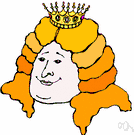monarch
(redirected from Monarchs)Also found in: Thesaurus, Encyclopedia.
mon·arch
(mŏn′ərk, -ärk′)n.
1. One who reigns over a state or territory, usually for life and by hereditary right, especially:
a. A sole and absolute ruler.
b. A sovereign, such as a king or empress, often with constitutionally limited authority: a constitutional monarch.
2. One that commands or rules: "I am monarch of all I survey" (William Cowper).
3. One that surpasses others in power or preeminence: "Mont Blanc is the monarch of the mountains" (Byron).
4. A monarch butterfly.
[Middle English monarke, from Old French monarque, from Late Latin monarcha, from Greek monarkhos : mono-, mono- + arkhein, to rule.]
mo·nar′chal (mə-när′kəl), mo·nar′chic (-kĭk), mo·nar′chi·cal (-kĭ-kəl) adj.
mo·nar′chal·ly, mo·nar′chi·cal·ly adv.
American Heritage® Dictionary of the English Language, Fifth Edition. Copyright © 2016 by Houghton Mifflin Harcourt Publishing Company. Published by Houghton Mifflin Harcourt Publishing Company. All rights reserved.
monarch
(ˈmɒnək)n
1. (Government, Politics & Diplomacy) a sovereign head of state, esp a king, queen, or emperor, who rules usually by hereditary right
2. a supremely powerful or pre-eminent person or thing
3. (Animals) Also called: milkweed a large migratory butterfly, Danaus plexippus, that has orange-and-black wings and feeds on the milkweed plant: family Danaidae
[C15: from Late Latin monarcha, from Greek; see mono-, -arch]
monarchal, monarchial adj
moˈnarchally adv
moˈnarchical, moˈnarchic adj
moˈnarchically adv
ˈmonarchism n
ˈmonarchist n, adj
ˌmonarˈchistic adj
Collins English Dictionary – Complete and Unabridged, 12th Edition 2014 © HarperCollins Publishers 1991, 1994, 1998, 2000, 2003, 2006, 2007, 2009, 2011, 2014
mon•arch
(ˈmɒn ərk, -ɑrk)n.
1. a hereditary sovereign, as a king, queen, or emperor.
2. a sole and absolute ruler of a state or nation.
3. a person or thing that holds a dominant position.
mo•nar•chal (məˈnɑr kəl) mo•nar′chi•al (-ki əl) adj.
mo•nar′chal•ly, adv.
Random House Kernerman Webster's College Dictionary, © 2010 K Dictionaries Ltd. Copyright 2005, 1997, 1991 by Random House, Inc. All rights reserved.
ThesaurusAntonymsRelated WordsSynonymsLegend:
Switch to new thesaurus
| Noun | 1. |  monarch - a nation's ruler or head of state usually by hereditary right monarch - a nation's ruler or head of state usually by hereditary rightCapetian - a member of the Capetian dynasty Carlovingian, Carolingian - a member of the Carolingian dynasty emperor - the male ruler of an empire chief of state, head of state - the chief public representative of a country who may also be the head of government Merovingian - a member of the Merovingian dynasty Shah, Shah of Iran - title for the former hereditary monarch of Iran |
| 2. |  monarch - large migratory American butterfly having deep orange wings with black and white markings; the larvae feed on milkweed monarch - large migratory American butterfly having deep orange wings with black and white markings; the larvae feed on milkweeddanaid, danaid butterfly - large tropical butterfly with degenerate forelegs and an unpleasant taste Danaus, genus Danaus - type genus of the Danaidae: monarch butterflies |
Based on WordNet 3.0, Farlex clipart collection. © 2003-2012 Princeton University, Farlex Inc.
monarch
noun ruler, king or queen, sovereign, tsar, potentate, crowned head, emperor or empress, prince or princess She will never stand down as monarch and we fully support her.
Collins Thesaurus of the English Language – Complete and Unabridged 2nd Edition. 2002 © HarperCollins Publishers 1995, 2002
Translations
مَلِكمَلِكٌ
monarchapanovníkvládce
monark
hallitsijamonarkki
monarh
egyeduralkodó
einvaldur; konungur, drottning
君主
세습적 군주
monarchasmonarchija
monarhs
monarcha
vladar
monark
เจ้าแผ่นดิน
quốc vương, nữ hoàng
Collins Spanish Dictionary - Complete and Unabridged 8th Edition 2005 © William Collins Sons & Co. Ltd. 1971, 1988 © HarperCollins Publishers 1992, 1993, 1996, 1997, 2000, 2003, 2005
Collins English/French Electronic Resource. © HarperCollins Publishers 2005
monarch
n → Monarch(in) m(f), → Herrscher(in) m(f); (fig) → König m; absolute monarch → Alleinherrscher(in) m(f)
Collins German Dictionary – Complete and Unabridged 7th Edition 2005. © William Collins Sons & Co. Ltd. 1980 © HarperCollins Publishers 1991, 1997, 1999, 2004, 2005, 2007
Collins Italian Dictionary 1st Edition © HarperCollins Publishers 1995
monarch
(ˈmonək) noun a king, queen, emperor, or empress.
ˈmonarchy – plural ˈmonarchies – noun (a country etc that has) government by a monarch.
Kernerman English Multilingual Dictionary © 2006-2013 K Dictionaries Ltd.
monarch
→ مَلِكٌ vládce monark Monarch μονάρχης monarca monarkki monarque monarh monarca 君主 세습적 군주 vorst monark monarcha monarca монарх monark เจ้าแผ่นดิน kral quốc vương, nữ hoàng 君主Multilingual Translator © HarperCollins Publishers 2009